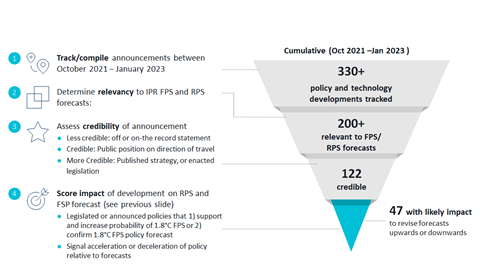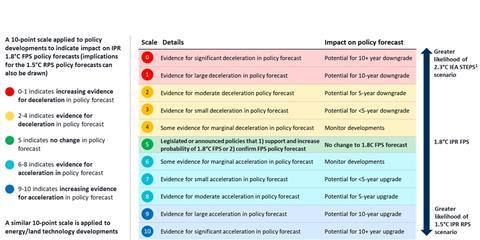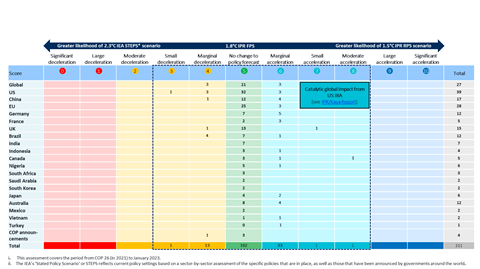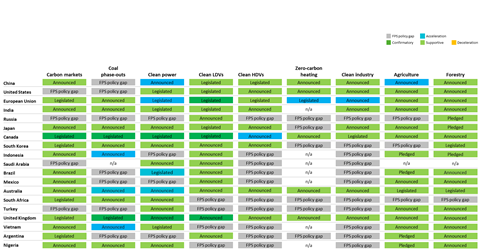Building on the October 2021 IPR 1.8°C Forecast Policy Scenario (FPS) and 1.5°C Required Policy Scenario (RPS) policy suite, in 2022 IPR is issuing Quarterly Forecast Trackers (QFTs) assessing climate policy, technology and land use developments and acceleration or deceleration in policy ambition against these 2021 IPR scenarios.
QFTs assess in detail developments policy, technology and land use in key sectors and regions which drive the energy and land transition. They determine any acceleration, deceleration or stagnation in energy and land-related policy ambition and technology developments.
IPR QFT assessment adopts a multi-step approach to assessing key policy and technology developments impacting FPS and RPS.
Read the full QFT Launch Media Release from April 2022 here.
Summary - IPR QFT assessment from Oct 2021 to Jan 2023 - multi-step approach to assessing key policy & technology developments impacting 1.8°C FPS & 1.5°C RPS
The methodology:

The Ten Point Scale
Policy developments each Quarter are scored using a 10-point scale to indicate strength and direction of impact on IPR scenario forecasts

The recent IPCC Sixth Assessment Reports (AR6) find evidence of climate change already causing widespread adverse impacts, some irreversible, which reinforces the urgency of immediate policy action.
As realities of climate change become increasingly apparent, IPR continues to expect that it is inevitable governments at national and international levels will be forced to act more decisively than they have so far.
The IPCC states that a 1.5°C scenario is still achievable but will require an immediate and deep emissions reductions across all sectors, countries and levels of government.
To date, IPR continues to track policy and technology momentum around achieving a 1.8°C climate objective (the current outcome forecast in the IPR FPS) while falling well short of RPS 1.5°C that outlines the policy changes that must take place to achieve a 1.5C outcome.
Quarterly Heat Map
Each quarter we will update this summary heat map . So far since the COP 26 last November policy has been confirmatory of the IPR FPS which predicts a 1.8C outcome.
Q1-Q4 2022 climate announcements have reinforced the 1.8°C Forecast Policy Scenario pathway and in some instances shown evidence of acceleration

IPR Policy Gap Analysis
At COP27, IPR launched the new IPR Policy Gap Analysis assessing total progress to date against the Inevitable Policy Response scenarios in the years preceding the 2025 ratchet. It builds upon the 2022 Quarterly Forecast Trackers and provides a sector by sector assessment of policy developments across the G20+ economies.
Policy developments supporting IPR 1.8°C FPS across G20+ economies

READ IPR’S 2022 POLICY GAP ANALYSIS
Quarterly Forecast Trackers
Q1 2022 QFT
Q2 2022 QFT
Q3 2022 QFT
Q4 2022 QFT
IPR Briefings
For more information on IPR, signatory briefings and presentations, please contact us at [email protected]












